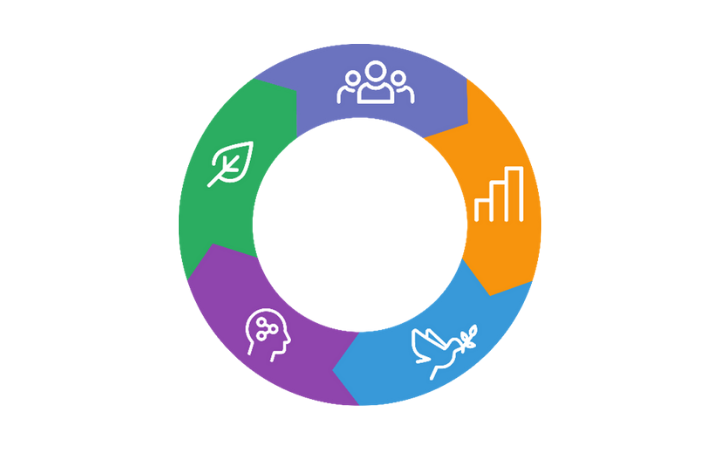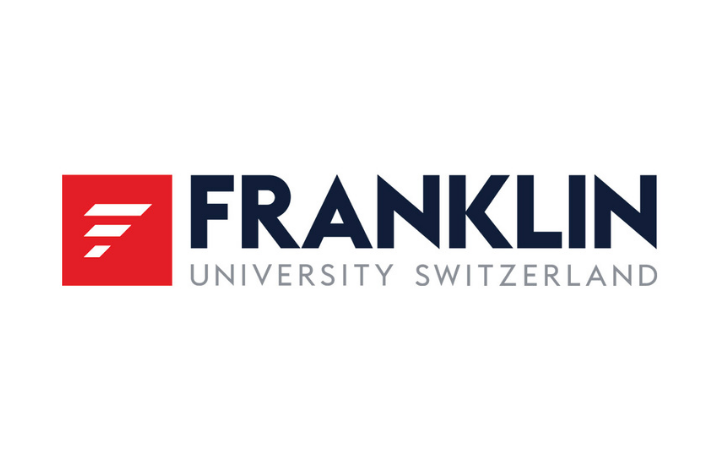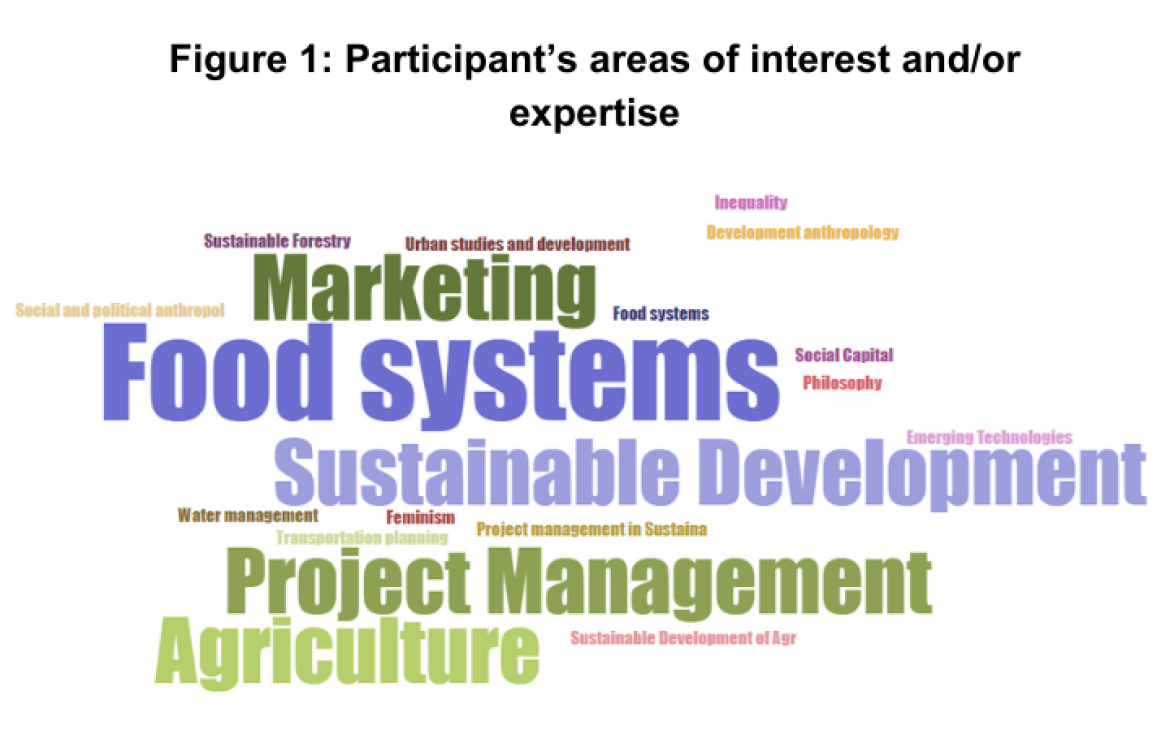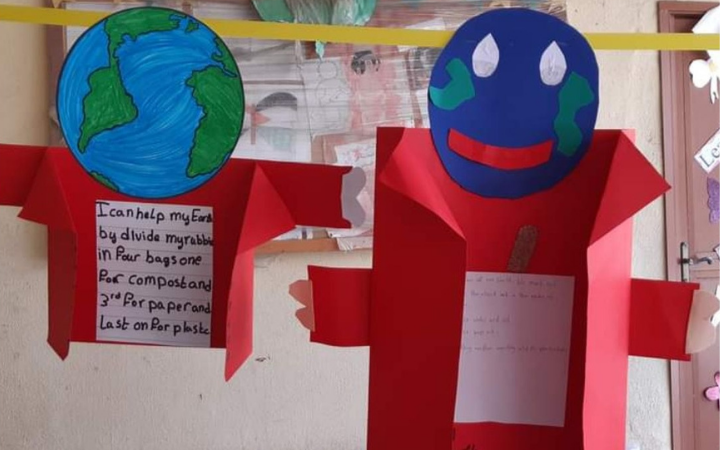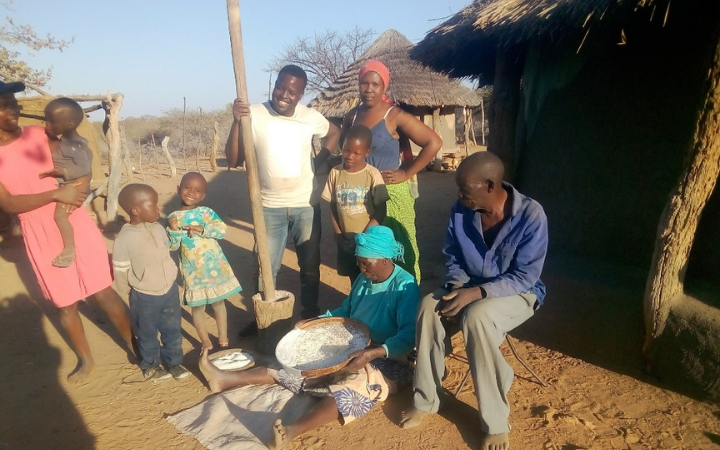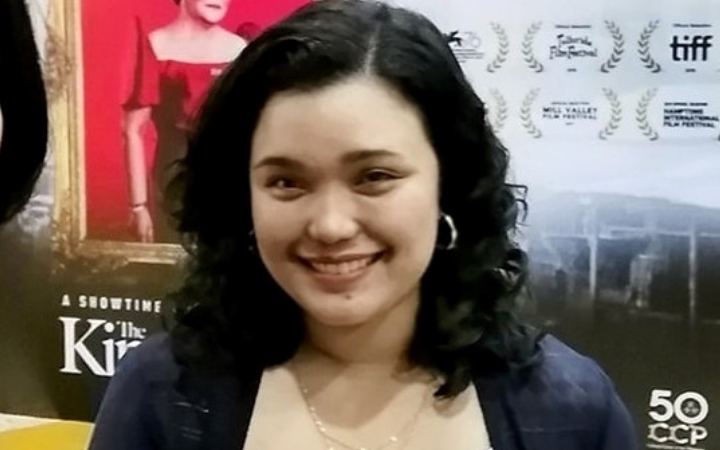Franklin University Switzerland and UNITAR organized a joint event during the Open Geneva Hackathon Festival. The online Hackathon "Food as a nexus for synchronic urban and rural development" offered a platform to generate innovative ideas to rethink and improve food as a linkage for development in rural and urban areas. The hackathon lasted three days and was delivered entirely online, allowing participants worldwide to join the event.
The event included the participation of UN-Habitat, FAO and UNITAR experts to facilitate workshops and group work activities. Four workshops to provide brainstorming and project development tools were delivered during the hackathon: (i) Brainstorming, from Idea to Concrete Plan; (ii) Sustainable migration to boost rural communities; (iii) How to pitch your idea; and (iv) Policy (with UN experts). The workshops' objective was to provide participants with the necessary tools to create a project proposal tackling modern challenges to harmonically achieve urban and rural sustainability. Participants were divided into groups and assigned one of the three challenges proposed by UN experts. The challenges proposed were:
- Re-naturalizing Cities – Facilitated by UN-Habitat: How can we increase agricultural production in cities and peri-urban areas with sustainable measures that mitigate and adapt to climate change? What new or existing technologies can be used for urban agricultural planning that, in addition, include the recycling of building materials, food waste, and rainwater?
- Empowering the Rural Youth through Food Security and Resiliency – Facilitated by UNITAR: How can the youth be informed on adapting to climate change in rural areas as well as empowered as climate actors? What innovative ideas or policies can overcome these challenges to promote a more inclusive and climate-resilient economy?
- Bridging the Gap between Food Availability and Pricing in Rural and Urban Areas – Facilitated by FAO: How can we bridge the gap between price and availability of food in urban and rural areas to make food more equally distributed, priced, and accessible to people?
Eighteen participants from eleven countries participated in the hackathon. Students, young professionals and young entrepreneurs joined the event to brainstorm solutions to bring together urban and rural development. This Impact Story collects participants' experiences and potential changes in perceptions and behavior after the event as a result of an innovative format to learning and action planning. Feedback from eight participants through an online survey and three semi-structured interviews are analyzed in this Impact Story.
Application of knowledge and skills from the hackathon
Survey respondents (hackathon participants) were undergraduate and postgraduate students who represented the largest group, as well as young professionals and young entrepreneurs. Except for one participant, respondents indicated that this was their first experience participating in a hackathon. However, respondents indicated that they were already familiar with the concepts of integrating innovation in sustainable development processes prior to the event. Survey respondents also indicated having some prior knowledge on sustainable development, food systems, food security or climate change adaptation gained from their academic or professional experience. Figure 1 below shows the participants' areas of expertise and/or interest, showcasing the alignment between participants’ interests/expertise and the hackathon theme.
Seven out of eight survey respondents confirmed applying knowledge and skills from the hackathon to their personal, academic or professional life. Application to the professional sphere was only mentioned by two participants, while the use of knowledge and skills in their academic life was the most common form of application (six out of eight participants). Examples of application of knowledge include incorporating collaborative thinking and cultural intelligence in working groups, incorporating ideas shared in the brainstorming sessions to their professional work, using knowledge for academic projects, transferring knowledge, and increasing individual awareness. The attribution of application of knowledge and skills is very diverse, being 64 per cent on average. Whereas most of the respondents indicated an attribution higher than 50 per cent, two of them indicated rates of 48 and 20 per cent, both young professionals.
The proposals derived from the hackathon challenges inspired survey respondents to change their mindset and adopt more sustainable behaviours and gain new knowledge and skills that have facilitated their academic or professional work. However, and as shown in the next section, they have not continued working on their proposals to develop more concrete projects or solutions to the presented challenges.
From the workshops organized during the hackathon, the sessions on "Brainstorming: from idea to concrete plan" and "How to pitch your idea" were suggested by survey respondents as the most useful for their success in their academic or professional life. In contrast, the workshop on Policy (with UN experts) was only considered helpful for their success by two respondents (out of eight).
Results from the interviews organized for this impact story suggest that one of the participants’ reasons to enrol in the hackathon was to expand their networks. Survey results suggest that most respondents have maintained contact with other participants from their team in the hackathon.
Impact Story - Enas Abd Ellatif
Enas Abd Ellatif
Science teacher and learning assistant for learning difficulties
Equipping students with knowledge on climate change and sustainable development
Beirut, Lebanon. Enas holds a bachelor's degree in biochemistry and has a strong commitment to improving education for children and young people. She is originally from Palestine but is currently based in Beirut, Lebanon. Enas is a science teacher in an elementary school and a learning assistant for learning difficulties at UNRWA. She also works as a private teacher for high school students in the fields of biology and chemistry. Enas is very passionate about tackling climate change issues. Her interest started from her own experience observing how climate change has posed challenges to people's livelihoods in the country. For example, how floods have damaged crop production, generating shortage in food supply or how pollution has contributed to the generation of diseases that primarily affect children. With her interest in knowing more about the issue, Enas decided to learn more about climate change and sustainable livelihoods to create awareness with her students.
Before the hackathon, Enas enrolled in a course on the Future Learn(1) platform focused on how to turn climate anxiety into positive actions. After that, she decided to do some healthy activities with her students from the primary school, such as planting some vegetables at school and using the playgrounds more frequently. Enas found the hackathon announcement on social media and decided to enrol to continue her learning path in sustainable development issues. Besides, she wanted to exchange experiences with people from other countries and regions to learn some good practices from common challenges.
With the hackathon, Enas became more inspired to continue promoting healthier lifestyles and cities’ renaturalization with her students. In the school, they have included into the science syllabus developing orchards in the playgrounds. Moreover, Enas has replicated some of the methodologies from the hackathon in her classes. During the hackathon, Enas participated in brainstorming exercises on how to change their personal lifestyle to be more healthy and environmentally friendly, which she has replicated with her students at school. Enas has observed changes in her student's attitudes regarding the preservation of the environment such as in waste separation, particularly regarding composting.
She has also started promoting these actions in her work as a learning assistant at UNRWA, which has supported her to include environmental education with the children. She would also like to participate in projects working on solar energy as a substitute for fuel energy as Lebanon is currently facing some problems in energy supply, leading to daily power outages.
Enas's interest in meeting people from around the world interested in climate change was satisfied with the hackathon. She considers the support from the event's experts and especially her team as motors to improve her confidence when advocating for climate change and its link to food systems and her listening skills. Enas said she got really inspired by her team colleagues from the hackathon, all of them women. Exchanging experiences with others gave her new ideas to contribute to rethinking her community to make it more harmonic with the environment. She would have liked to continue working on the proposal elaborated during the hackathon, perhaps with further support from the experts, facilitators or other organizations interested in it.
Impact Story - Qinisela Pardon Dube
Qinisela Pardon Dube
International Relations Student
Gaining knowledge on sustainable development
Lublin, Poland. Qinisela, who asked us to call him “Q”, is a student of the master's in international relations with a focus on international institutions. He is originally from Zimbabwe and moved to Poland for his master's studies. He holds a bachelor's degree in geography and population studies with a focus onn environmental protection. His work experience has also focused on the environmental sector. Before his master's studies, Qinisela worked as an intern at the environmental management agency in Zimbabwe. He worked on projects related to land degradation, climate change, global warming, and food systems, amongst others.
Qinisela wanted to accumulate more knowledge in his areas of interest, especially food security. His interest in these topics and the possibility to extend his professional network motivated him to enrol in the hackathon. He recognizes that with the hackathon, he became aware of different challenges people go through according to their place of residence, which may be completely different from the experience he knew from the Sub-Saharan Africa region.
The knowledge and skills gained from the hackathon have helped Qinisela in his academic life. Particularly, he used some of the knowledge gained from the event for an assignment on his sustainable development course and right when we were speaking with Qinisela, he obtained his grade for this very course assignment. Qinisela says he incorporated some of the ideas collected during the hackathon for his project on designing a sustainable campus, an Ecocampus. He described the nexus between urban and rural areas for sustainable food systems. "Sometimes rural areas tend to have more land and opportunities for farming but they lack the financial resources, as opposed to the urban areas, which might have the financial power to produce but lack land or sometimes urban areas have green spaces that are not produced." Qinisela's idea was to promote sustainable livelihood food in urban areas' green spaces in small-scale farming to satisfy primary needs. He considers that participating in the hackathon helped him to perform better in this assignment.
Qinisela feels fully confident to apply the knowledge and skills from the hackathon and attributes this confidence to his passion for creating change. Qinisela is very motivated to support other young people from rural areas in their projects after his studies. He is motivated by what can be gained regarding their local or indigenous knowledge and how to improve their livelihoods. Qinisela plans to concentrate his professional life in the fields of rural development, food security and environmental protection. He would like to participate in projects or actions using bottom-up approaches that help empower people.
IMPACT STORY - Zhea Katrina Estrada
Zhea Katrina Estrada
PhD Student of Anthropology and lecturer
Working towards sustainable cities
Manila, The Philippines. Katrina has a bachelor's and master's degree in philosophy and is currently completing her PhD in anthropology. She is also a lecturer at the University of Santo Tomas in Manila. As part of her doctorate studies, Katrina followed a course on development anthropology, focused on the dynamics between communities and organizations implementing projects/working with communities in the field. By that time, she received an invitation to join the hackathon from her university and she thought it would be relevant for her studies. It also captured her interest as she is really passionate about social issues. Besides, Katrina had never participated in a hackathon before. Katrina assesses the hackathon as beneficial for her academic life and it motivated her to adopt more sustainable behaviours in her personal life.
Katrina's course on development anthropology comprised information on food security in urban areas. She was able to share what she had learned during the hackathon with her group. In the hackathon, Katrina was assigned the challenge of re-naturalising cities. She and her team came along with a proposal of building rainwater-catching systems in cities and organic farming. The idea was to install rainwater-catching designs to supply vertical farming in cities, which usually experience food and water shortages. For the course, students were asked to present projects that could be implemented in communities to address local needs and Katrina took ideas from the hackathon to present hers. In her personal life, Katrina was already interested in these topics before the hackathon and had adopted farming practices at home, but she feels that her motivation to continue implementing these practices was boosted by the hackathon. She realized that simple proposals can have an impact on (many) people's lives.
Katrina would like to fully implement the project proposal from the hackathon and is looking for support from her professor at the university. Still, she has not been able to start implementing her ideas. Katrina would also like to implement the project in her neighbourhood, but the mobility restrictions adopted due to the COVID-19 pandemic have made it more difficult for her to organize the activities. Nevertheless, she has changed her consumption behaviours after participating in the hackathon by reducing her plastic waste generation. Although she has not implemented her project, Katrina feels very confident to do so as she believes simple ideas can have a big impact if done correctly.
Katrina still maintains connections with her team from the hackathon. Even if they do not speak constantly, they can see each other's work on social media. Meeting people from all over the world who are also concerned about environmental issues has helped Katrina widen her perspective on the topic and increase her commitment to this.
Conclusion
This hackathon is aimed at introducing international participants to the topic of synchronic urban and rural development and engaging them in the process of open innovation for bridging this nexus. This impact story confirms participants’ achievement of the event objective by showcasing their increase of awareness of the topic and motivation to implement innovative, yet simple, solutions to tackle challenges on bridging the gap between urban and rural development. Notably, the increased motivation for implementation of ideas, reveals a change of perception driven by the hackathon, to address the topic with participatory, community-based and bottom-up approaches.
Although the application of knowledge from the hackathon in participant’s professional life might not be as clear as in other UNITAR traditional learning formats, e.g., workshops, courses or fellowship programmes, some degree of application is recognized by participants in their personal and/or academic life. These include change in consumer behaviours, improved performance in their academic activities, transfer of knowledge and improvement of soft skills. The participants’ professional profile is also relevant to the type of application observed since most of the survey respondents (and also hackathon attendees) were students and hence workplace application was not possible.
Suggestions from participants to pursue application of knowledge cover receiving written feedback after the presentation and follow-up on the project proposals developed during the hackathon and connecting participants with organisations working on the topic to help implement the proposal.


